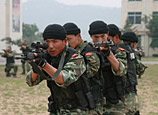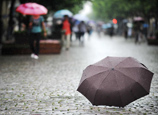
WASHINGTON, July 3 (Xinhua) -- Two HIV positive patients who underwent bone marrow transplants no longer have detectable virus in their blood cells, even after stopping anti-retroviral therapy for months, U.S. researchers reported Wednesday.
Timothy Henrich and Daniel Kuritzkes, physician-researchers at the Boston Brigham and Women's Hospital said the two have shown no signs of HIV after they were off anti-retroviral therapy for 15 weeks and seven weeks, respectively.
"While these results are exciting, they do not yet indicate that the men have been cured," Henrich said in a statement.
"Long-term follow up of at least one year will be required to understand the full impact of a bone marrow transplant on HIV persistence," said Henrich.
Last summer, Henrich and Kuritzkes announced that the virus was easily detected in blood lymphocytes of both men prior to their transplants and became undetectable by eight months post- transplant. However, at the time, the men remained on anti- retroviral therapy.
The two were off anti-retroviral therapy this spring and continued to have no detectable HIV virus in their blood, the researcher said, adding that the men are frequently monitored and they have expanded on their prior findings by further examining large volumes of cells, plasma and tissue.
"We demonstrated at least a 1,000 to 10,000 fold reduction in the size of the HIV reservoir in the peripheral blood of these two patients," said Henrich. "But the virus could still be present in other tissues such as the brain or gastrointestinal track."
He noted that if virus does return, it would suggest that these other sites are "an important reservoir of infectious virus and new approaches to measuring the reservoir at relevant sites will be needed" to guide the development of HIV curative strategies.
According to the researchers, the bone marrow transplants were performed because both patients had blood cancer, so the findings don't apply to most patients with HIV. The treatment is also expensive and risk, and carries a 15 to 20 percent risk of death.
The new findings were presented at the International AIDS Society Conference in Kuala Lumpur, Malaysia.
Earlier this year, doctors reported that they had " fundamentally cured" a 2-year-old girl in Mississippi by introducing high doses of anti-retroviral drugs shortly after her birth.


















![]()
